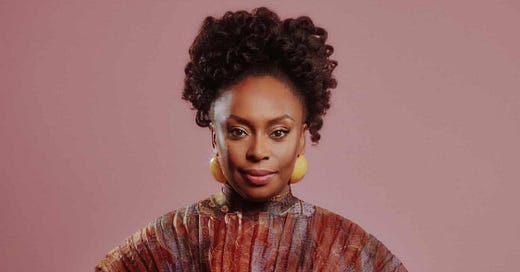I love Chimamanda Ngozi Adichie, so much so that when my dog had seven puppies last year I named one of them after her when I registered it with the Kennel Club.
I’ve pre-ordered her new novel, Dream Count, and I’ve sent her 2014 essay We Should All Be Feminists to many, many women in my life.
So I settled down to read her interview in The Guardian newspaper at the weekend with delight. Here is a woman, about the same age as me, who is an absolute queen. Not only that but a black woman whose truth we seek, whose wisdom we crave, thank goodness she is respected and revered as she should be, that her voice is so important to so many. And yet, as I read on through the interview I began to feel a great wave of sadness come over me.




